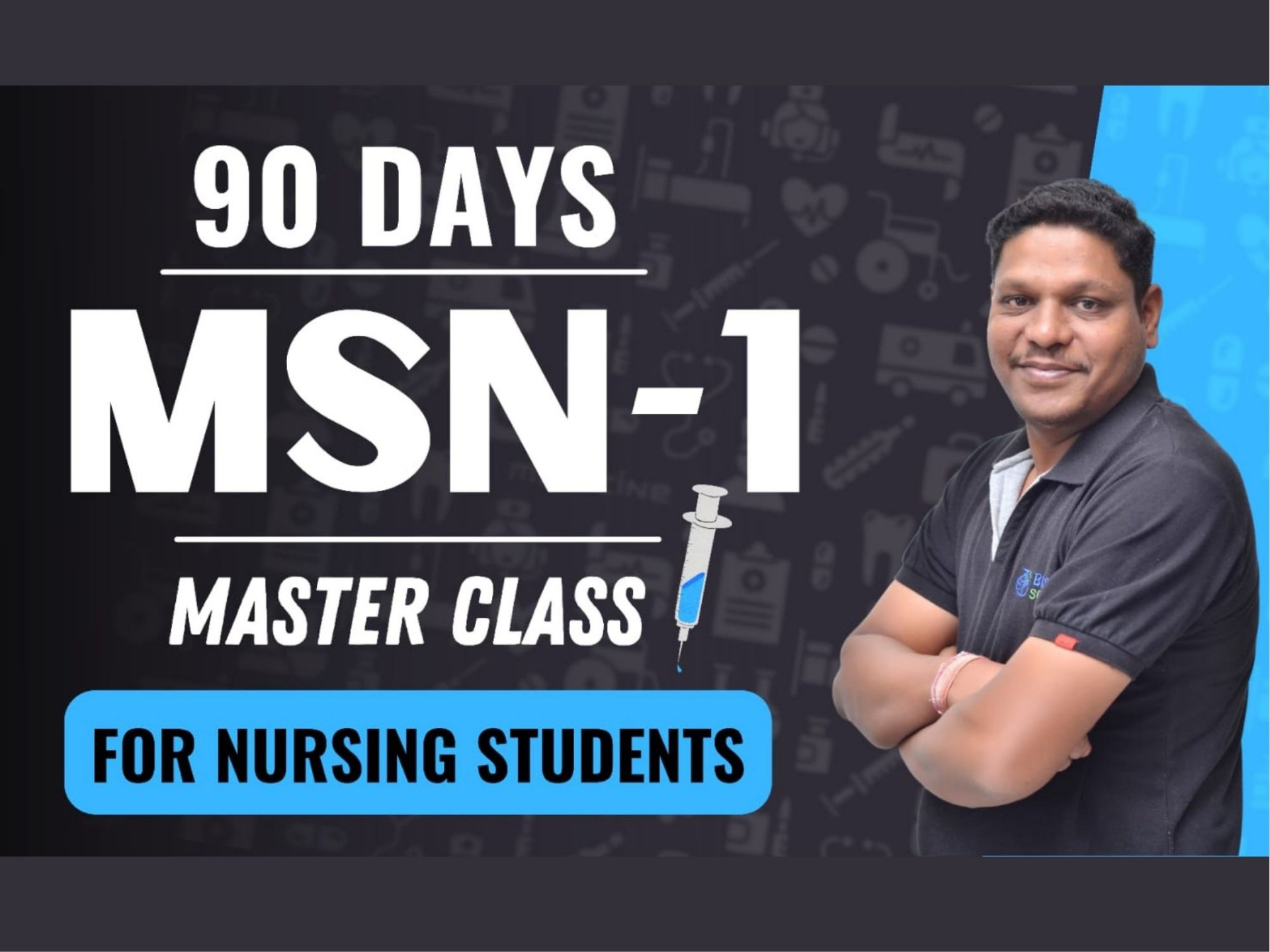
MSN-I Master Class is a 90 days course for nursing students. This syllabus will cover the following syllabus 1. Introduction: Introduction to medical surgical nursing – Evolution and trends of medical and surgical nursing Review of Concepts of Health and illness, Disease – concepts, causations, classification- International Classification of Diseases (ICD – 10 or later version), Acute illness chronic illness & Terminal illness, stages of illness Review of concepts of comprehensive nursing care in medical surgical conditions based on nursing process. Role of nurse, patient and family in care of adult patient Role and responsibilities of a nurse in medical surgical settings: Outpatient department In-patient unit Intensive care unit. Home and community setting Introduction to medical surgical asepsis Inflammation and infection Immunity Wound healing Care of surgical patient Pre-operative Intra operative Post operative 2. Common signs and symptoms and management Fluid and electrolyte imbalance Vomiting Dyspnea and cough, respiratory obstruction Fever Shock Unconsciousness, syncope Pain Incontinence Edema Age related problems-geriatric 3. Nursing management of patients (adults including elderly) with respiratory problems Review of anatomy and physiology of respiratory system Nursing assessment – History and Physical assessment Etiology, Pathophysilogy, clinical manifestations, diagnosis, treatment modalities and medical, surgical, dietetic & nursing management of adults including elderly with – Upper Respiratory tract infections Bronchitis Asthma Emphysema Atelectasis Chronic Obstructive Pulmonary Disease (COPD) Bronchiectasis Pneumonia Pulmonary tuberculosis Lung abscess Pleural effusion Cysts and tumours Chest Injuries Respiratory arrest and insufficiency Pulmonary embolism Special therapies, alternative therapies Nursing procedures Drugs used in treatment of respiratory disorders 4. Nursing Management of patient (adults including elderly) with disorders of digestive system Review of anatomy and physiology of digestive system Nursing assessment-history and physical assessment Etiology, pathophysiology, Clinical manifestations, diagnosis, treatment modalities and medical, surgical, dietetics & nursing management Disorders of Oral cavity-lips, gums tongue, salivary glands and teeth Oesophague – inflammation, stricture, obstruction, bleeding and tumours Stomach and deudenum hiatus hernia, gastritis, peptic and duodenal ulcer, bleeding, tomours, pyloric stenosis. Small intestinal disorders- inflammation and infection, enteritis, malabsorption, obstruction, tumour and perforation Large intestinal disorders- colitis, inflammation and infection, obstruction and tumour and lump Hernias Appendix-inflammation, mass, abscess, rupture Anal & Rectum; hemorrhoids, fissures, fistulas Peritonitis/acute abdomen Pancreas; inflammation, cyst, abscess and tumours Liver; inflammation, cyst, abscess, cirrhosis, portal hypertension, hepatic failure, tumours Gall Bladder; inflammation, obstruction, stones and tumours Special therapies, alternative therapies Nursing procedures Drugs used in treatment of disorders of digestive system 5. Nursing management of patient (adults including elderly) with blood and cardio vascular problems Review of anatomy and physiology of blood and cardio vascular system, Nursing Assessment-History and physical assessment Etiology, Pathophysiology, clinical manifestation diagnosis, treatment modalities and medical, surgical, dietetics & nursing management of - Vascular system Hypertension, hypotension Artheriosclerosis Raynaud’s disease Aneurism and peripheral Vascular disorders Heart Coronary artery diseases Ischemic Heart Disease Coronary atherosclerosis Angina pectoris Myocaridal infarction Valvular disorders of the heart Congential and acquired Rehumatic Heart disease Endocarditis, pericarditis, Myocaridtis Cardio Myopathies Cardiac dysrhythmias, Heart Block Congestive cardiac failure Cor-pulmonale, pulmonary edema, cardiogenic shock, cardiac temponade Cardiac emergices and arrest Cardio Pulmonary Resuscitation (CPR) Blood Anaemias Polycythemia Bleeding disorders; clotting factor defects and platelets defects Thalassemia Leukaemias Leukopenias and agranulocytosis Lymphomas Myelomas Special therapies Blood transfusion, safety checks, procedure and requirements, management of adverse transfusion reaction, records for blood transfusion. Management and counseling of blood donors, phlebotomy procedure, and post donation management, blood bank functioning and hospital transfusion committee. Bio-safety and waste management in relation to blood transfusion Role of a nurse in Organ donation, retrieval and banking Alternative therapies Nursing procedures Drugs used in treatment of blood and cardio vascular disorders